初中英语情态动词专项练习题(含答案)(20200710091950)
初中英语情态动词练习题(含答案)

初中英语情态动词练习题(含答案)必修模块3系统语法梳理——情态动词⽤法(学⽣版)⼀、情态动词基本⽤法●情态动词语⽓强弱对⽐●情态动词重点⽤法解析1. can与could(1)表能⼒,常译为“____________”,如:例:我会说⽇语,但是不会写。
(2)表⽰允许,常译为“____________”,could可以表⽰更为委婉的请求或许可,如:例:你可以在这屋⼦⾥吸烟。
(3)表推测,常⽤来表⽰“惊讶、怀疑、不相信等态度”,多⽤于___________或___________中,could表⽰可能性⽐can ⼩,如:例:他是个诚实的⼈,他不可能撒谎。
2. may与might(1)表⽰许可或征询对⽅许可,常译为“____________”,表⽰征询许可时,may与can / could可以换⽤,但might ⽐may的语⽓更婉转⼀些;对含may的⼀般疑问句的肯定回答可⽤_________或________,否定回答⽤___________或__________,如:例:—我可以进来吗?—不,你不能进来。
(2)表推测,译为“______________________”,多⽤于肯定句或否定句中;may not表⽰“___________”,might ⽐may的可能性⼩,如:例:他现在可能很忙。
(3)may⽤于祈使句表“祝愿”例:祝你成功!(4)may / might as well do sth.3. will与would(1)表⽰“请求、建议”,⼀般⽤于_________⼈称的疑问句中,would⽐will更婉转(2)表⽰“意志、愿望和决⼼”,⼀般译为_________________,would表⽰过去的意愿和决⼼例:我再也不会做那件事了。
(3)表⽰习惯性动作或某种倾向例:鱼离开⽔就会死。
(1)shall⽤于__________________⼈称做主语的疑问句中,表⽰说话⼈征求对⽅的意见或向对⽅请⽰例:今晚我们⼲什么呢?(2)shall⽤于主语是第⼆、第三⼈称做主语的句⼦中,表⽰说话⼈对对⽅的_____________________________或⽤于______________________________,表⽰强制性例:如果你不努⼒学习,你会学习不及格。
初中英语情态动词练习题30题含答案解析

初中英语情态动词练习题30题含答案解析1.You ask your teacher for help if you don't understand.A.canB.couldC.mayD.might答案解析:A。
“can”表示有能力做某事或有权利做某事,在这个语境中表示有权利向老师寻求帮助。
“could”语气更委婉,但通常用于过去时态或表示虚拟语气。
“may”表示可能性较小的允许或推测。
“might”语气比“may”更弱。
2.I borrow your pen?A.CanB.CouldC.MayD.Might答案解析:C。
“may”用于请求许可,比较正式。
“can”也可以用于请求许可,但语气没有“may”正式。
“could”和“might”语气更委婉,但通常用于过去时态或表示虚拟语气。
3.He finish his homework on time.A.canB.couldC.mayD.might答案解析:A。
“can”表示有能力做某事,这里表示他有能力按时完成作业。
“could”表示过去的能力或委婉的可能性。
“may”和“might”表示可能性较小的推测。
4.She come to the party if she has time.A.canB.couldC.mayD.might答案解析:C。
“may”表示可能性较小的推测,这里表示她如果有时间可能会来参加派对。
“can”表示有能力或有权利做某事,不太符合这个语境。
“could”和“might”语气更委婉,但通常用于过去时态或表示虚拟语气。
5.We go to the park tomorrow if it's sunny.A.canB.couldC.mayD.might答案解析:C。
“may”表示可能性较小的推测,这里表示如果明天天气晴朗我们可能去公园。
“can”表示有能力或有权利做某事,不太符合这个语境。
“could”和“might”语气更委婉,但通常用于过去时态或表示虚拟语气。
初一英语情态动词练习题40题含答案解析
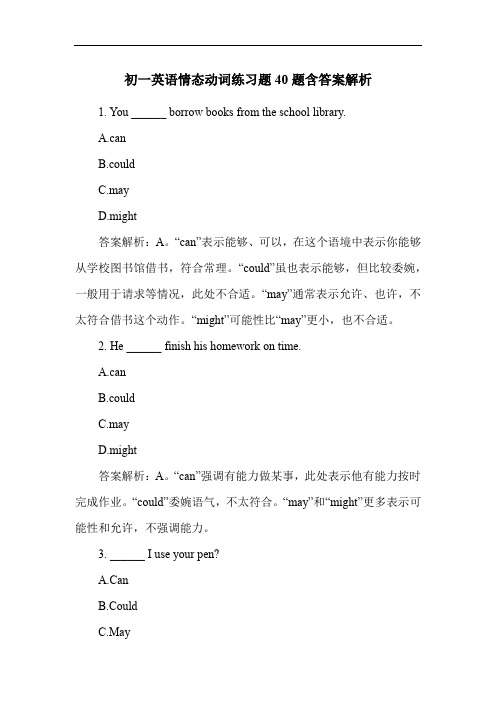
初一英语情态动词练习题40题含答案解析1. You ______ borrow books from the school library.A.canB.couldC.mayD.might答案解析:A。
“can”表示能够、可以,在这个语境中表示你能够从学校图书馆借书,符合常理。
“could”虽也表示能够,但比较委婉,一般用于请求等情况,此处不合适。
“may”通常表示允许、也许,不太符合借书这个动作。
“might”可能性比“may”更小,也不合适。
2. He ______ finish his homework on time.A.canB.couldC.mayD.might答案解析:A。
“can”强调有能力做某事,此处表示他有能力按时完成作业。
“could”委婉语气,不太符合。
“may”和“might”更多表示可能性和允许,不强调能力。
3. ______ I use your pen?A.CanB.CouldC.May答案解析:A 或C 都可以。
“Can I use your pen?”和“May I use your pen?”在请求别人允许时都可以用。
“could”和“might”语气更委婉,但不如“can”和“may”常用。
4. She ______ come to school early tomorrow.A.canB.couldC.mayD.might答案解析:C 或D。
“may”和“might”都表示可能性,此处表示她明天可能早点来学校。
“can”和“could”强调能力,不太符合语境。
5. We ______ listen to the teacher carefully in class.A.canB.couldC.mayD.might答案解析:A。
“can”表示能够、应该,在课堂上我们应该认真听老师讲课,符合语境。
“could”委婉语气,不太恰当。
“may”和“might”更多表示可能性和允许。
初中英语情态动词专项练习(附答案解析)
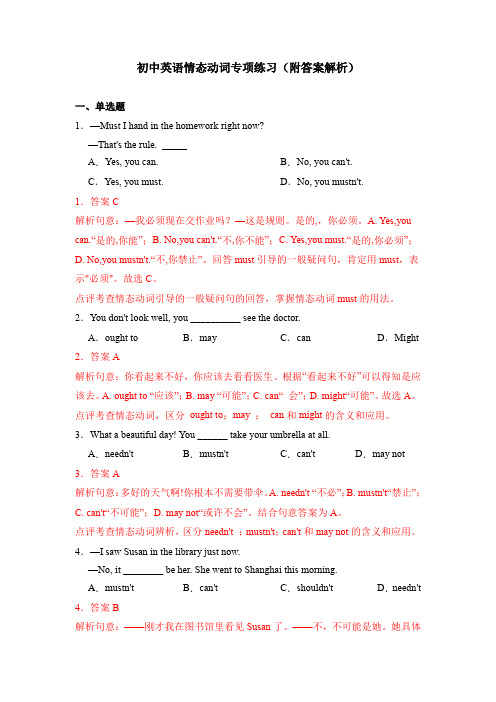
初中英语情态动词专项练习(附答案解析)一、单选题1.—Must I hand in the homework right now?—That's the rule.A.Yes, you can.B.No, you can't.C.Yes, you must.D.No, you mustn't.1.答案C解析句意:—我必须现在交作业吗?—这是规则。
是的,,你必须。
A. Yes,you can.“是的,你能”;B. No,you can't.“不,你不能”;C. Yes,you must.“是的,你必须”;D. No,you mustn't.“不,你禁止”。
回答must引导的一般疑问句,肯定用must,表示"必须"。
故选C。
点评考查情态动词引导的一般疑问句的回答,掌握情态动词must的用法。
2.You don't look well, you __________ see the doctor.A.ought to B.may C.can D.Might 2.答案A解析句意:你看起来不好,你应该去看看医生。
根据“看起来不好”可以得知是应该去。
A. ought to “应该”;B. may “可能”;C. can“ 会”;D. might“可能”。
故选A。
点评考查情态动词,区分ought to;may ;can和might的含义和应用。
3.What a beautiful day! You ______ take your umbrella at all.A.needn't B.mustn't C.can't D.may not 3.答案A解析句意:多好的天气啊!你根本不需要带伞。
A. needn't “不必”;B. mustn't“禁止”;C. can't“不可能”;D. may not“或许不会”。
初中英语情态动词练习题及答案
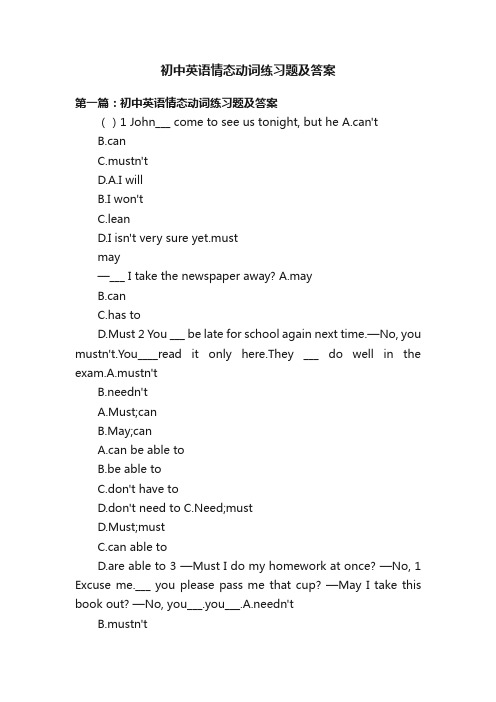
初中英语情态动词练习题及答案第一篇:初中英语情态动词练习题及答案()1 John___ come to see us tonight, but he A.can'tB.canC.mustn'tD.A.I willB.I won'tC.leanD.I isn't very sure yet.mustmay—___ I take the newspaper away? A.mayB.canC.has toD.Must 2 You ___ be late for school again next time.—No, you mustn't.You____read it only here.They ___ do well in the exam.A.mustn'tB.needn'tA.Must;canB.May;canA.can be able toB.be able toC.don't have toD.don't need to C.Need;mustD.Must;mustC.can able toD.are able to 3 —Must I do my homework at once? —No, 1 Excuse me.___ you please pass me that cup? —May I take this book out? —No, you___.you___.A.needn'tB.mustn'tC.can'tA.DoB.ShouldC.WouldD.Must A.can'tB.may notC.needn'tD.aren'tYou___ go and see a doctor at once because you're got a fever.A.canB.mustC.dareD.would—Can you speak Japanese? —No, I____.A.mustn'tB.can'tC.needn'tD.may not 1.– He___ be in the classroom, I think —No, he ___ be in the classroom.I saw him go home a minute ago.A.can;may not B.must;may notC.may;can'tD.may;mustn't —Shall I get one more cake for you, Dad? —Thanks, but you___, I've had enough.A.may not B.must notC.can'tD.needn't Even the top students in our class can't work out this problem, so itbe very difficult.A.mayB.mustC.canD.need 4 He isn't at school.I think he ___ be ill.A.canB.shallC.mustD.has to 5 ___ I take this one?A.MayB.WillC.AreD.Do 1 The children___ play football on the road.D.may not His arm is all right.He___ go and see the doctor.A.has not toB.don't have toC.haven't toD.doesn't have toHe had to give up the plan, ___ he?A.didB.didn'tC.doesD.doesn't They had to walk here, ___ they?A.mustn'tB.didC.didn'tD.hadn't He had better stay here, ___ he?A.doesn'tB.don'tC.hadn'tD.isn't 2 You'd better___late next time.A.not to be B.not beC.won't beD.don't beYou'd better ___ your hair ___ once a month.A.had;cutB.had;cuttedC.have;cutD.have;cutted 4 You___ ask that man over there.Maybe he knows the way.A.had better not toB.had not betterC.had betterD.had better not 1 —Shall we go and visit the History Museum next Sunday? —________ A.Here you areB.Sorry, I can'tC.Yes, pleaseD.Let me try —Why don't you ask Mike to go with us? —Thanks, ___.___ you like to have another try?A.CouldB.WillC.WouldD.Do 3 —Would you like to go boating with us? —Yes, ___.A.I'd likeB.I wantC.I'd like toD.I do 1 You___ worry about your son.He willget well soon.A.needn'tB.can'tC.mustn'tD.have toThe poor man needs our help, ___ he?A.needB.needn'tC.doesD.doesn't —Must we do our homework first? —No, you___.You may have a rest first.A.mustn't B.needn't C.may not D.can't 1.I told Sally how to get here, but perhaps I _______ for her.A.had to write it out B.must have written it out C.should have written it outD.ought to write it out 2.—There were already five people in the car but they managed to take me as well.—It _______ a comfortable journey.A.can’t beB.shouldn’t beC.mustn’t have beenD.couldn’t have been 3.It’s nearly seven o’clock.Jack _______ be here at any moment.A.must B.NeedC.shouldD.can 4.Johnny, you _______ play with the knife, you _______ hurt yourself.A.won’t;can’tB.mustn’t;mayC.shouldn’t;mustD.can’t;shouldn’t 5.The fire spread through the hotel veryquickly but everyone _______ get out.A.had toB.wouldC.couldD.was able to6.—When can I come for the photos? I need them tomorrow afternoon.—They _______ be ready by 12:00.A.canB.shouldC.mightD.need7.—I stayed at a hotel while in New York.—Oh, did you? You _______ with Barbara.A.could have stayedB.could stayC.would stayD.must have stayed8.—Are you coming to Jeff’s party?—I’m not sure.I _______ go to the concert instead.A.mustB.wouldC.shouldD.might9.I was really anxious about you.You _______ home without a word.A.mustn’t leaveB.shouldn’t have leftC.couldn’t have leftD.needn’t leave10.—Is John coming by train?—He should, but he _______ not.He likes driving his car.A.mustB.canC.needD.may11.A left-luggage office is a place where bags _____ be left fora short time, especially at a railway station.A.should B.canC.mustD.will12.I wonder how he _______ that to the teacher.A.dare to sayB.dare sayingC.not dare sayD.dared say13.When he was there, he ___ go to that coffee shop at the corner after work every day.A.would B.shouldC.had betterD.might14.It has been announced that candidates _____ remain in their seats until all the papers have been collected.A.canB.willC.mayD.shall15.How ______ou say that you really understand the whole story if you have covered only a part of the article?A.canB.mustC.needD.may 16.—I hear you’ve got a set of valuable Australian coin._______ I have a look?—Yes, certainly.A.DoB.MayC.ShallD.Should 【巧学活用参考答案】1.1-5 A D A B B2.1-5 C D B C A3.1-3 C A A4.1-3 D B C5.1-4 C B C C6.1-3 B A B7.1-3 C C C8.1-3 A D B 情态动词练习参考答案1.C。
初一英语情态动词can与could用法练习题50题(带答案)
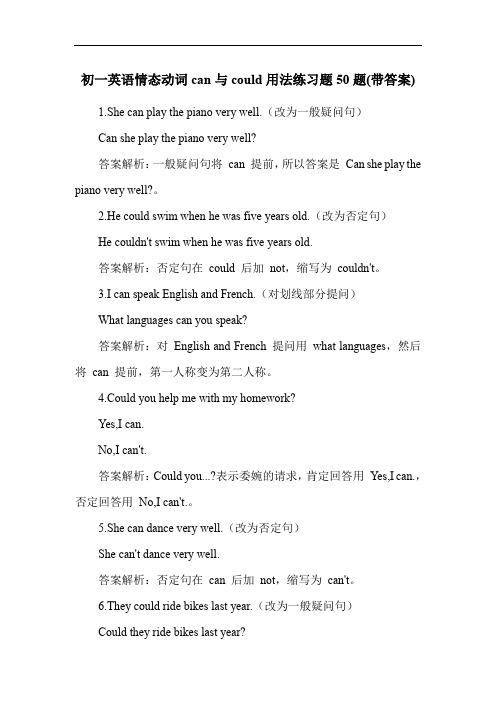
初一英语情态动词can与could用法练习题50题(带答案)1.She can play the piano very well.(改为一般疑问句)Can she play the piano very well?答案解析:一般疑问句将can 提前,所以答案是Can she play the piano very well?。
2.He could swim when he was five years old.(改为否定句)He couldn't swim when he was five years old.答案解析:否定句在could 后加not,缩写为couldn't。
3.I can speak English and French.(对划线部分提问)What languages can you speak?答案解析:对English and French 提问用what languages,然后将can 提前,第一人称变为第二人称。
4.Could you help me with my homework?Yes,I can.No,I can't.答案解析:Could you...?表示委婉的请求,肯定回答用Yes,I can.,否定回答用No,I can't.。
5.She can dance very well.(改为否定句)She can't dance very well.答案解析:否定句在can 后加not,缩写为can't。
6.They could ride bikes last year.(改为一般疑问句)Could they ride bikes last year?答案解析:一般疑问句将could 提前。
7.Can you sing a song for us?Yes,I can.No,I can't.答案解析:Can you...?表示请求,肯定回答用Yes,I can.,否定回答用No,I can't.。
初中英语情态动词专项练习题(含答案)

初中英语情态动词专项练习题(含答案)初中英语情态动词专项练习题情态动词是一种本身有一定的词义,但要与动词原形及其被动语态一起使用,给谓语动词增添情态色彩,表示说话人对有关行为或事物的态度和看法,认为其可能、应该或必要等。
情态动词后面加动词原形。
情态动词有四类:①只做情态动词:must,can(could),may(might)……②可做情态动词又可做实义动词:need,will③具有情态动词特征:have(had,has) to,used to,ought to④情态动词表猜测:一肯一否三不定(must一肯,can not一否,may,might,could,三不定。
)注:mustn't代表强烈禁止must 表示主观,have to表示客观。
常用的有:can may could must have use .情态动词无人称和数的变化,情态动词后面跟的动词须用原形,否定式构成是在情态动词后面加"not"。
个别情态动词有现在式和过去式两种形式,过去式用来表达更加客气,委婉的语气,时态性不强,可用于过去,现在或将来。
情态动词属非及物动词,故没有被动语态。
情态动词表推测的用法小结(一)情态动词表推测的三种句式1.在肯定句中一般用must (一定),can,could(可能),might /may(也许,或许)。
e.g:(1)He must/can/may,might know the answer to this question.他一定/可能/也许知道这个问题的答案。
(2)It is cold in the room. They must have turned off the heating.屋里很冷,他们肯定把暖气关了。
2.否定句中用can’t / couldn’t(不可能),may not/mightnot(可能不)。
e.g:(1)It can’t/couldn’t be the headmaster. He has gone to America.这不可能是校长,他去美国了。
情态动词专项练习题及答案
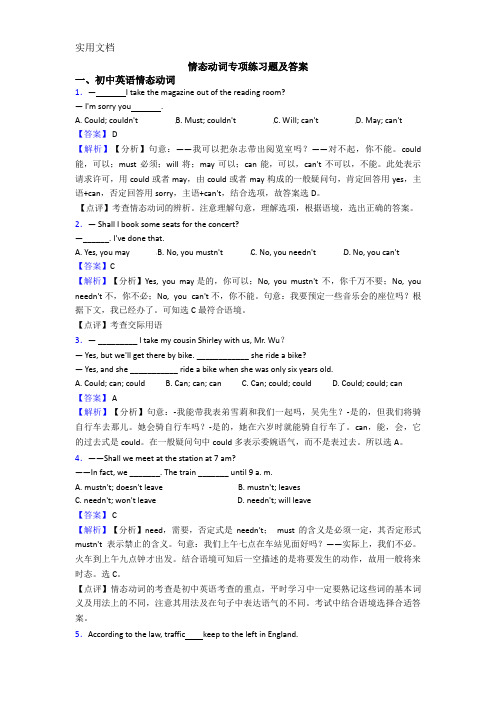
情态动词专项练习题及答案一、初中英语情态动词1.— I take the magazine out of the reading room?— I'm sorry you .A. Could; couldn'tB. Must; couldn'tC. Will; can'tD. May; can't【答案】 D【解析】【分析】句意:——我可以把杂志带出阅览室吗?——对不起,你不能。
could 能,可以;must必须;will将;may可以;can能,可以,can't不可以,不能。
此处表示请求许可,用could或者may,由could或者may构成的一般疑问句,肯定回答用yes,主语+can,否定回答用sorry,主语+can't,结合选项,故答案选D。
【点评】考查情态动词的辨析。
注意理解句意,理解选项,根据语境,选出正确的答案。
2.— Shall I book some seats for the concert?—______. I've done that.A. Yes, you mayB. No, you mustn'tC. No, you needn'tD. No, you can't【答案】C【解析】【分析】Yes, you may是的,你可以;No, you mustn't 不,你千万不要;No, you needn't不,你不必;No, you can't不,你不能。
句意:我要预定一些音乐会的座位吗?根据下文,我已经办了。
可知选C最符合语境。
【点评】考查交际用语3.— _________ I take my cousin Shirley with us, Mr. Wu?— Yes, but we'll get there by bike. ____________ she ride a bike?— Yes, and she ___________ ride a bike when she was only six years old.A. Could; can; couldB. Can; can; canC. Can; could; couldD. Could; could; can【答案】 A【解析】【分析】句意:-我能带我表弟雪莉和我们一起吗,吴先生?-是的,但我们将骑自行车去那儿。
情态动词专项练习(附答案)
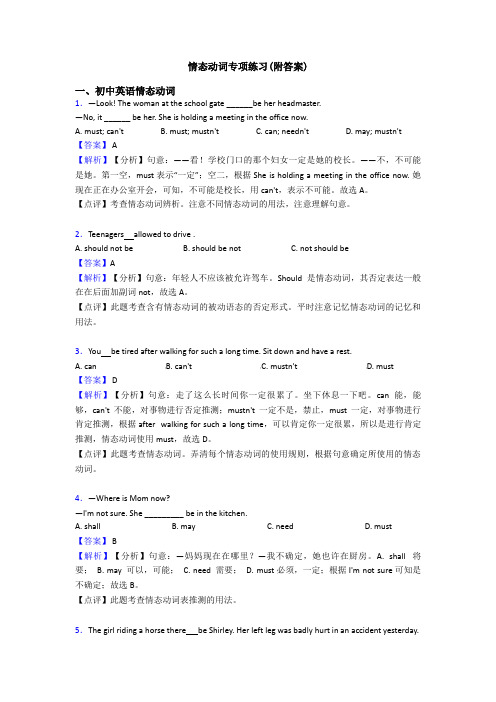
情态动词专项练习(附答案)一、初中英语情态动词1.—Look! The woman at the school gate ______be her headmaster.—No, it ______ be her. She is holding a meeting in the office now.A. must; can'tB. must; mustn'tC. can; needn'tD. may; mustn't【答案】 A【解析】【分析】句意:——看!学校门口的那个妇女一定是她的校长。
——不,不可能是她。
第一空,must表示“一定”;空二,根据She is holding a meeting in the office now. 她现在正在办公室开会,可知,不可能是校长,用can't,表示不可能。
故选A。
【点评】考查情态动词辨析。
注意不同情态动词的用法,注意理解句意。
2.Teenagers allowed to drive .A. should not beB. should be notC. not should be【答案】A【解析】【分析】句意:年轻人不应该被允许驾车。
Should是情态动词,其否定表达一般在在后面加副词not,故选A。
【点评】此题考查含有情态动词的被动语态的否定形式。
平时注意记忆情态动词的记忆和用法。
3.You be tired after walking for such a long time. Sit down and have a rest.A. canB. can'tC. mustn'tD. must【答案】 D【解析】【分析】句意:走了这么长时间你一定很累了。
坐下休息一下吧。
can能,能够,can't不能,对事物进行否定推测;mustn't一定不是,禁止,must一定,对事物进行肯定推测,根据after walking for such a long time,可以肯定你一定很累,所以是进行肯定推测,情态动词使用must,故选D。
七年级英语情态动词练习题含答案
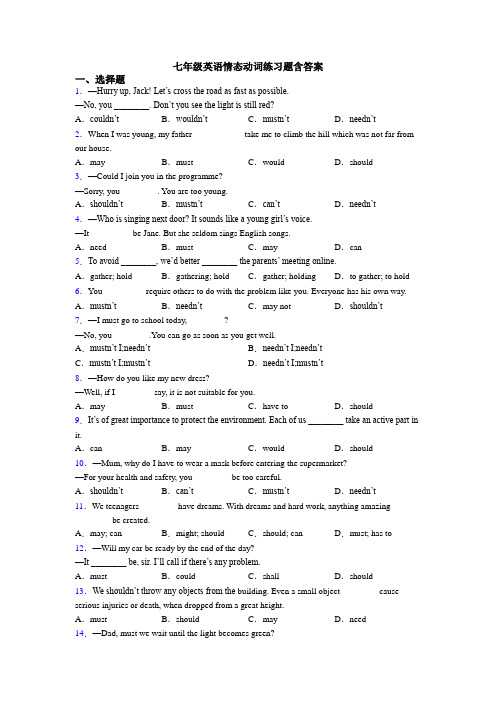
七年级英语情态动词练习题含答案一、选择题1.—Hurry up, Jack! Let’s cross the road as fast as possible.—No, you ________. Don’t you see the light is still red?A.couldn’t B.wouldn’t C.mustn’t D.needn’t2.When I was young, my father ___________ take me to climb the hill which was not far from our house.A.may B.must C.would D.should 3.—Could I join you in the programme?—Sorry, you ________. You are too young.A.shouldn’t B.mustn’t C.can’t D.needn’t 4.—Who is singing next door? It sounds like a young girl’s voice.—It _________ be Jane. But she seldom sings English songs.A.need B.must C.may D.can5.To avoid ________, we’d better ________ the parents’ meeting online.A.gather; hold B.gathering; hold C.gather; holding D.to gather; to hold 6.You ________ require others to do with the problem like you. Everyone has his own way. A.mustn’t B.needn’t C.may not D.shouldn’t7.—I must go to school today, ________?—No, you ________.You can go as soon as you get well.A.mustn’t I;needn’t B.needn’t I;needn’tC.mustn’t I;mustn’t D.needn’t I;mustn’t8.—How do you like my new dress?—Well, if I ________ say, it is not suitable for you.A.may B.must C.have to D.should9.It’s of great importance to protect the environment. Each of us ________ take an active part in it.A.can B.may C.would D.should 10.—Mum, why do I have to wear a mask before entering the supermarket?—For your health and safety, you ________ be too careful.A.shouldn’t B.can’t C.mustn’t D.needn’t11.We teenagers ________ have dreams. With dreams and hard work, anything amazing________ be created.A.may; can B.might; should C.should; can D.must; has to 12.—Will my car be ready by the end of the day?—It ________ be, sir. I’ll call if there’s any problem.A.must B.could C.shall D.should13.We shouldn’t throw any objects from the building. Even a small object ________ cause serious injuries or death, when dropped from a great height.A.must B.should C.may D.need 14.—Dad, must we wait until the light becomes green?—Yes, I am afraid we ________. That’s the traffic rule.A.may B.can C.have to D.need 15.Exercise is helpful but it ________ be regular (规律的) exercise.A.must B.may C.can D.need16.You'd better __________ hard from now on, __________ you will fail the exam. A.work; and B.working; or C.working; and D.work; or 17.— Mom, must I clean my room now?— No, you ________. You can do it after dinner.A.needn’t B.mustn’t C.shouldn’t D.can’t18.— Zoe, what do you think is the greatest advantage of shopping online?— At least I ______ spend much time going from shop to shop.A.shouldn’t B.can’t C.needn’t D.mustn’t19.---Will you be back early this evening?---Yes, but I ________ be a little late. Our boss sometimes has extra work for us.A.may B.must C.need D.will20.— Excuse me, could you tell me where the Nanjing Brocade Museum is?— G o along this road for five minutes. You ________ miss it. It’s a huge building. A.mustn’t B.can’t C.needn’t D.shouldn’t 21.—Excuse me. I haven’t finished reading the book yet. May I keep it a bit longer?— Sorry, you ________. You must return it on time.A.needn’t B.can’t C.won’t D.shouldn’t 22.—Must I finish all my homework today, Mum?—No, you ________, my dear. You can finish some tomorrow if you like.A.needn’t B.shouldn’t C.can’t D.mustn’t23.— Mum, why do I have to wash hands so many times a day?—You ________ be too careful, for your health.A.can’t B.mustn’t C.may not D.needn’t 24.—Will Jim come to Yangzhou for a holiday?—He ________come and it depends on how much homework he will have.A.may B.should C.must D.need25.—In China, many parents complain that their children have to stay up late to do the homework.—Don’t worry. The government has realized the problem. I’m sure there ________ be good news soon.A.can B.should C.need D.must26.You ________ pay too much attention to protecting yourself if you plan to go abroad. A.mustn’t B.can’t C.shouldn’t D.needn’t 27.—Shall I tell him the change of the time right now?—I’m afraid you ________, otherwise he will be late for the meeting.A.can B.may C.must D.need28.—Will dad arrive home at 6 o’clock to have dinner with us this evening?— I think he will, but he ________ not. Sometimes he works extra hours.A.can B.must C.need D.may29.Sorry, smoking is not allowed here. If you ________ , you will be fined according to the rules. A.can B.will C.may D.must30.Look at the floor, Tom! ________ you watch TV while having a meal?A.Should B.Could C.Must D.May31.— Listen! Tom ________ be listening to the music while doing his homework.—Let’s go upstairs to remind him to turn it off.A.should B.could C.would D.must32.Cars ________ give way to walkers on some roads in Binhai, or the drivers will be fined. A.may B.will C.can D.must 33.Sometimes smiles ________ be false, hiding other feelings like anger, fear or worry. A.should B.would C.must D.can34.—Could you tell me how to renew the library books?—With pleasure. You ________ come to our desk every time. It’s easier to renew them online. A.can’t B.mustn’t C.needn’t D.shouldn’t35.For the safety of the passengers, objects like guns ________ be carried on board.A.may not B.needn’t C.might not D.mustn’t 36.—Mum, I bought some strawberries on my way home.—Oh, you’re so sweet. But the strawberries ________ be put into the fridge for freshness. A.must B.can C.may D.need 37.—Who’s the man over there? Is that Mr. Blac k?—It ________ be him. Mr. Black is much taller than that man.A.may B.must C.can’t D.mustn’t38.—I don’t care what people think.—Well, you _______ . Some opinions are worth weighing.A.should B.might C.could D.would39.—I think they are enough. We ________ make so many chairs.—I don’t think so. Because nearly a quarter of them need ________.A.don’t need to; mending B.needed; to be mendedC.don’t need; mend D.need; to mend40.—Seventy dollars for such a dress! You ________ be joking!—I’m serious. It’s made of silk from Hangzhou.A.must B.need C.will D.can【参考答案】一、选择题1.C解析:C【详解】句意:——快点,杰克!让那个我们尽快地过马路。
初中英语情态动词专项训练25题

初中英语情态动词专项训练25题1. We ______ be polite to our elders. (答案:should)解析:should 表示“应该”,我们应该对长辈有礼貌。
2. You ______ hand in your homework on time. (答案:must)解析:must 表示“必须”,你必须按时交作业。
3. He ______ come to the party if he is free. (答案:may)解析:may 表示“可能”,如果他有空,他可能来参加聚会。
4. They ______ not play football in the street. (答案:must)解析:must not 表示“禁止,不许”,他们不许在街上踢足球。
5. I ______ swim when I was five. (答案:could)解析:could 表示“能够”,我五岁的时候就能游泳了。
6. He ______ be at home. I just saw him in the supermarket.A. can'tB. mustC. mayD. should答案:A解析:“can't”表示“不可能”,根据后句“我刚在超市看到他”可知他不可能在家。
7. The light is on. She ______ be at home.A. canC. mightD. could答案:B解析:“must”表示“一定”,灯亮着,她一定在家。
8. They ______ know the answer. They look so confused.A. can'tB. mustC. may notD. should答案:A解析:“can't”表示“不可能”,他们看起来很困惑,所以不可能知道答案。
9. He ______ have gone to Beijing. I saw him yesterday.A. can'tB. mustC. mayD. should答案:A解析:“can't”表示“不可能”,昨天还看到他,所以不可能去北京。
初中英语情态动词练习题及含答案
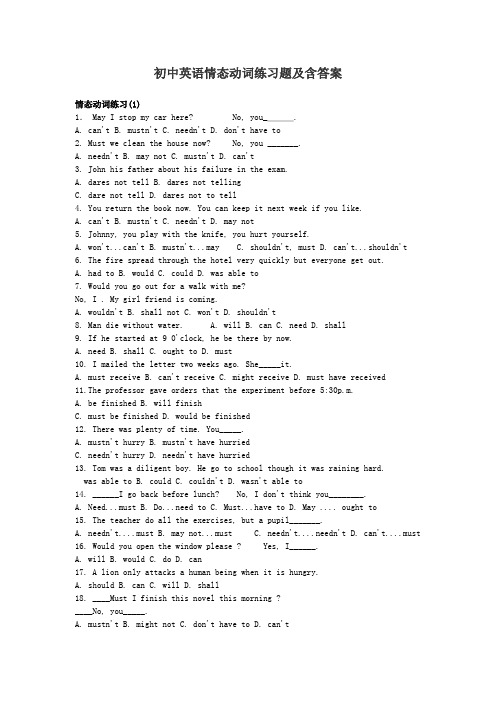
初中英语情态动词练习题及含答案情态动词练习(1)1. May I stop my car here? No, you____.A. can'tB. mustn'tC. needn'tD. don't have to2. Must we clean the house now? No, you _______.A. needn'tB. may notC. mustn'tD. can't3. John his father about his failure in the exam.A. dares not tellB. dares not tellingC. dare not tellD. dares not to tell4. You return the book now. You can keep it next week if you like.A. can'tB. mustn'tC. needn'tD. may not5. Johnny, you play with the knife, you hurt yourself.A. won't...can'tB. mustn't...mayC. shouldn't, mustD. can't...shouldn't6. The fire spread through the hotel very quickly but everyone get out.A. had toB. wouldC. couldD. was able to7. Would you go out for a walk with me?No, I . My girl friend is coming.A. wouldn'tB. shall notC. won'tD. shouldn't8. Man die without water. A. will B. can C. need D. shall9. If he started at 9 0'clock, he be there by now.A. needB. shallC. ought toD. must10. I mailed the letter two weeks ago. She_____it.A. must receiveB. can't receiveC. might receiveD. must have received11.The professor gave orders that the experiment before 5:30p.m.A. be finishedB. will finishC. must be finishedD. would be finished12. There was plenty of time. You_____.A. mustn't hurryB. mustn't have hurriedC. needn't hurryD. needn't have hurried13. Tom was a diligent boy. He go to school though it was raining hard.was able to B. could C. couldn't D. wasn't able to14. ______I go back before lunch? No, I don't think you________.A. Need...mustB. Do...need toC. Must...have toD. May .... ought to15. The teacher do all the exercises, but a pupil_______.A. needn't....mustB. may not...mustC. needn't....needn'tD. can't....must16. Would you open the window please ? Yes, I______.A. willB. wouldC. doD. can17. A lion only attacks a human being when it is hungry.A. shouldB. canC. willD. shall18. ____Must I finish this novel this morning ?____No, you_____.A. mustn'tB. might notC. don't have toD. can't19. The taxi ____ only hold six passengers. It is full. You take the next one.A. may...mayB. can...mayC. may...canD. must...can20. I a little earlier, but I met a friend of mine on the way.A. may comeB. may have comeC. could have comeD. must have come21. I wish to go home now, I?A. mayB. can'tC. mustD. do22. He must have finished his homework, he?A. mustn'tB. didn'tC. needn'tD. hasn't23. This pen looks like mine, yet it isn't. Whose it be?A. mustB. canC. mayD. might24. He didn't do well in the exam. He hard at his lessons.A. must have workedB. ought to have workedC. would have workedD. has worked25. I wonder how he that to the teacher.A. dare to sayB. dare sayingC. not dare sayD. dared say26. Mr Baker, a number of students want to see you. _____ they wait here or outside?A. ShouldB. WillC. ShallD. Are27. You the trees. Look, it is raining now.A. mustn't have wateredB. needn't have wateredC. could have wateredD. might have watered28. I give you an answer tomorrow. I promise!A. mustB. willC. mayD. shall29. As a soldier, you do as the head tells you.A. willB. shallC. mayD. ought30. The streets are all dry. It_____ during the night.A. can't have rainedB. must have rainedC. couldn't rainD. shouldn't have rained31. "When _____ he leave the hospital?" I asked the doctor.A. willB. shallC. canD. may32. They have not finish the work up to now.____Well, they ______A. should haveB. shouldC. ought toD. ought have33. Since it is already midnight, we______.A. had better leavingB. ought to have leaveC. should take our leaveD. might as well leave34. you be happy!A. MayB. CanC. MustD. Would35. Must we come tomorrow?A. No, you can'tB. No, you needn'tC. No, you mustn'tD. No, you may not36. You miss the lesson, though we have it on Thursday.A. mustn't...needn'tB. needn't....mustn'tC. mustn't...mustn'tD. needn't...needn't37. To succeed in a difficult task,_____.A. one needs to work hardB. to work hard is neededC. you need be a hard working personD. to work hard is what one needs38. In case I______, I would try again.A. will failB. would missC. should failD. shall miss39. Some people feel that handguns______.A. should controlB. should be controlledC. must be controllingD. can be control40. ______ open the door for you ?A. Would you like that IB. Do you want that IC. Will ID. Shall I41. My son ____ the examination, but he wasn't careful enough.A. might be able to passB. must have passedC. could have passedD. were able to pass42. Isn't it strange that the lazy boy pass the exam?A. shouldB. hasC. mightD. would43. We the work so early without your help.A. couldn't finishB. can't finishC. couldn't have finishedD. can't have finished44. We the manager, but no one _____ his telephone number.A. could have called, knewB. could have called, had knownC. could call, had knownD. could call, knew45. "Would you come and join them?""I wish I . But I am busy at this moment.A. can'tB. couldn'tC. couldD. can46. If Alice this afternoon, the meeting should be put off.A. would not comeB. might not comeC. should not comeD. could not come47. I didn't see her in the meeting room this morning. She at the meeting.A. mustn't have spokenB. shouldn't have spokenC. needn't have spokenD. couldn't have spoken48. With so much work on hand, you to see the game last night.A. mustn't goB. shouldn't goC. couldn't have goneD. shouldn't have gone49. I thought you like something to read, so I have brought you some books.A. mayB. mightC. couldD. must50. There was plenty of time. She______.A. mustn't have hurriedB. couldn't have hurriedC. must not hurryD. needn't have hurried51. It's still early, you______.A. mustn't hurryB. wouldn't hurryC. may not hurryD. don't have to hurry52. Please open the window,________?A. can't youB. aren't youC. do youD. will you53. We for her because she never came.A. mustn't have waitedB. shouldn't have waitedC. mustn't waitD. needn't wait54. May I stop here?No, you ____.A. mustn'tB. might notC. needn'tD. won't55. He _____ you more help, even though he was very busy.A. might have givenB. might giveC. may have givenD. may give56. I didn't see her in the meeting room this morning. She at the meeting.A. mustn't have spokenB. shouldn't have spokenC: needn't have spoken D. couldn't have spoken57. Could I borrow your dictionary? Yes, of course you______.A. mightB. willC. canD. should58. Please don't make a noise. --I'll be as quiet as a mouse.A. Yes, I won'tB. No, I won'tC. No, I willD. Yes, I will59. The young man has made so much noise that he not have been allowed to attend theconcert.A. couldB. mustC. wouldD. should60. One ought for what one has done.A. not to be punishedB. to not be punishedC. to not punishedD. not be punished61. If you really want yourself to be in good health, you must always so much..A. not, be smokingB. not, have smokedC. not, to smokeD. be not, smoking62. Where is Mary?She isn't here. I think she_____.A. may have gone homeB. must have gone homeC. might have gone homeD. All the above63. I think Helen is at home.No, she be at home, for she phoned me from the airport just five minutes ago.A. mustn'tB. needn'tC. can'tD. dared not64. She is already two hours late. What to her?A. can have happenedB. may have happenedC. should have happenedD. must happen65. “ he be watching TV now?”"Yes, he be watching TV now?""No, he be watching TV now."A. Must, can, mustn'tB. Can ,must, can'tC. Can, can, mustn'tD. May, must, needn't66. You must be a writer, ______?A. mustn't youB. are youC. must youD. aren't you67. You must have seen him last night, ?A. haven't youB. didn't youC. don't youD. must you68. I got up early this morning, but I _______so because I had no work to do.A. mustn't have doneB. didn't need to doC. needn't have doneD. can't have done69. Let's say that you could go there again, how feel?A. will youB. should youC. would youD. do you70. I daren't tell you what he did for fear that he angry with.A. will beB. isC. wasD. should be71. Without the leadership of the Party, there no New China.A. would beB. has beenC. wasD. should be72. It is necessary that we a foreign language.A. must masterB. ought to masterC. masterD. should master73. Most of the students felt rather disappointed at the English party. They say that it _______ better organized.A. had beenB. had to beC. must have beenD. could have been74. I am surprised that he to help me when I needed it most.A. should refuseB. would have refusedC. should have refused toD. may have refused75. Look! Tom is too sleepy to work .He __ up watching TV.A. mustn't have stayedB. shouldn't have stayedC. mustn't stayD. ought not to say. 练习题答案1-10 BACCB DCADD 11-20 ADACA ACCBC 21-30 ADBBDCBBBA 31-40 BADAB AACBD 41-50 CACAC CDDBD 51-60 DDBAA DCBDA61-70 ADCAB DBCCB 71-75 ADDCB。
七年级英语:情态动词专项练习带答案解析
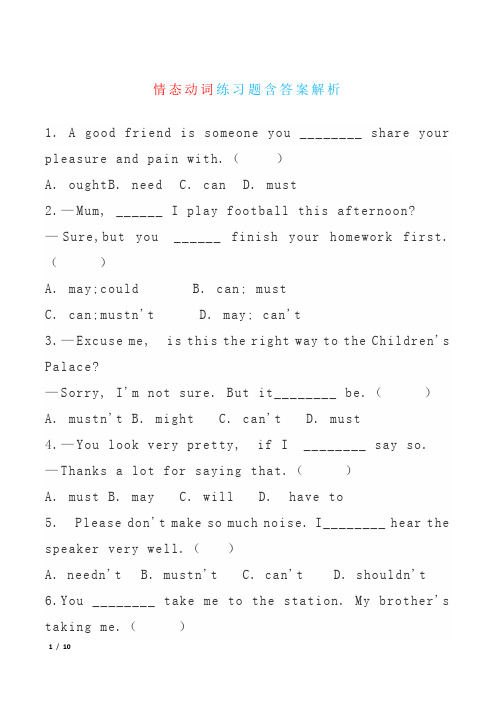
情态动词练习题含答案解析1. A good friend is someone you ________ share your pleasure and pain with.()A. oughtB. needC. canD. must2.—Mum, ______ I play football this afternoon?—Sure,but you ______ finish your homework first.()A. may;couldB. can; mustC. can;mustn'tD. may; can't3.—Excuse me, is this the right way to the Children's Palace?—Sorry, I'm not sure. But it________ be.()A. mustn'tB. mightC. can'tD. must4.—You look very pretty,if I ________ say so. —Thanks a lot for saying that.()A. mustB. mayC. willD. have to5. Please don't make so much noise. I________ hear the speaker very well.()A. needn'tB. mustn'tC. can'tD. shouldn't6.You ________ take me to the station. My brother's taking me.()A. can'tB. mustn'tC. shouldn'tD. don't have to7.—Mum, ________ I visit the Modern ArtMuseum next Monday?—I'm afraid you can't. All the museums in thiscity are closed on Monday.()A. wouldB. needC. shouldD. may8.We need clean air and water,so we ________ protect the environment.()A. canB. mayC. mustD. might9. —What should we do to protect the fish in the river?—We________ throw rubbish into the river.()A. needB. needn'tC. mustD. mustn't10.—What's wrong with Judy? She has been absent for two days.—Oh, she_____ be ill. Let's go to ask Mr. Green.()A. mayB. needC. would11.—We've got everything ready for the picnic.—Do you mean I______ bring anything with me?()A. can't B. mustn't C. couldn't D. needn't12.—Excuse me, ________ I take the magazine out of the reading room?—Sorry, you can't. Just here, please.()A. mustB. wouldC. mayD. need13.Rock music ___ sound popular with the young,but it's not the favor of the aged people.()A. mustB. needC. shouldD. may14.—Must I wait here all morning? I have a lot of work to do.—No, you____. You may be back in the afternoon.()A. mustn'tB. can'tC. don't have to15.The passengers ______ show their ID cards before getting on the plane.()A. mightB. mustC. could16. —Finally, they came back.—They_____ be hungry after such a long walk.()A. can'tB. mustC. needn't17. —I still haven't found my pet dog.—I'm sorry to hear that. You_____ be very sad.()A. canB. shouldC. mustD. will18. —Look at the young lady in red. Is it Mrs.Li?—No. It________ be her. She is wearing a white dress today.()A. mustn'tB. needn'tC. can't19. —Is that man Mr.Zhang?—It________ be him. He went to Beijing for a meeting yesterday.()A. can'tB. mustn'tC. needn't20. The girl in the classroom ________ be Sarah. She has gone to the library.()A. mayB. mustC. can'tD. needn't21. —Whose bike is this?—I am not sure. It ________ be Mary's.()A. shallB. mustC. might22. —Where are you going this month?—We________ go to Xiamen,but we're not sure.()A. needn'tB. mightC. mustD. mustn't23. —Is Tom coming by train?—He________ drive his car,I'm not sure.()A.can't B. may C. Must解析答案句意:一个好朋友就是和你一起分享你的快乐和悲伤的人。
初中英语情态动词练习题及答案[4]
![初中英语情态动词练习题及答案[4]](https://img.taocdn.com/s3/m/ce691bdb580216fc710afdcf.png)
初中英语情态动词练习题及答案(word版可编辑修改)初中英语情态动词练习题及答案(word版可编辑修改)编辑整理:尊敬的读者朋友们:这里是精品文档编辑中心,本文档内容是由我和我的同事精心编辑整理后发布的,发布之前我们对文中内容进行仔细校对,但是难免会有疏漏的地方,但是任然希望(初中英语情态动词练习题及答案(word版可编辑修改))的内容能够给您的工作和学习带来便利。
同时也真诚的希望收到您的建议和反馈,这将是我们进步的源泉,前进的动力。
本文可编辑可修改,如果觉得对您有帮助请收藏以便随时查阅,最后祝您生活愉快业绩进步,以下为初中英语情态动词练习题及答案(word版可编辑修改)的全部内容。
( )1 John___ come to see us tonight , but he isn’t very sure yet 。
A. may B 。
can C. has to D 。
Must2 They ___ do well in the exam.A. can be able to B 。
be able toC. can able toD. are able to 3 —May I take this book out? —No, you___。
A. can'tB. may notC. needn'tD. aren’t4 You___ go and see a doctor at oncebecause you're got a fever. A. canB 。
must C. dare D. would 5 -Can you speak Japanese ? —No ,I____。
A. mustn’t B。
can’t C. needn't D 。
may not1。
– He___ be in the classroom , Ithink —No , he___ be in the classroom 。
初中英语情态动词练习50题
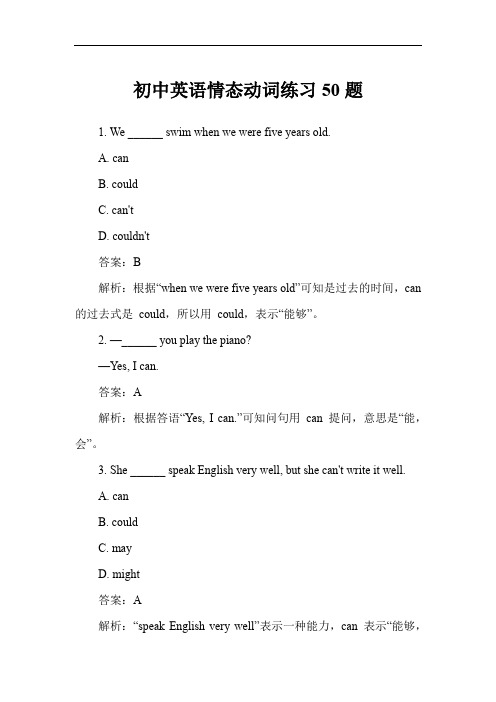
初中英语情态动词练习50题1. We ______ swim when we were five years old.A. canB. couldC. can'tD. couldn't答案:B解析:根据“when we were five years old”可知是过去的时间,can 的过去式是could,所以用could,表示“能够”。
2. —______ you play the piano?—Yes, I can.答案:A解析:根据答语“Yes, I can.”可知问句用can 提问,意思是“能,会”。
3. She ______ speak English very well, but she can't write it well.A. canB. couldC. mayD. might答案:A解析:“speak English very well”表示一种能力,can 表示“能够,会”,符合句意。
4. —______ I use your pen?—Sure. Here you are.答案:C解析:May I...? 表示征求对方的许可,意思是“我可以......吗?”5. You ______ be careful when you cross the road.A. canB. couldC. mustD. might答案:C解析:must 表示“必须”,过马路必须小心,强调必要性。
6. We __________ go to the park tomorrow if the weather is nice.A. mayB. mightC. mustD. can答案:A解析:“may”表示可能性,“might”语气更委婉、不确定,“must”表示必须,“can”表示能够。
根据语境,如果明天天气好,我们“可能”去公园,这里可能性较大,用“may”。
7. She __________ be late for the meeting. I'm not sure.A. mayB. mightC. mustD. can't答案:B解析:“I'm not sure.”表明不确定,“might”比“may”语气更不确定,所以这里用“might”表示她“可能”会迟到。
七年级英语(完整版)情态动词专项练习及解析
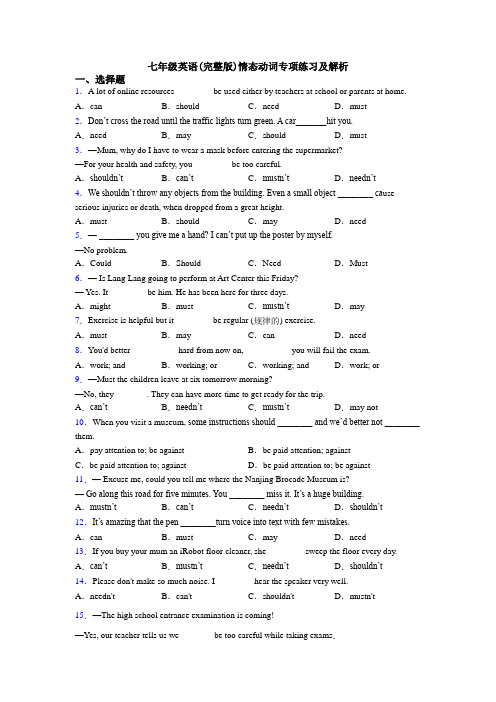
七年级英语(完整版)情态动词专项练习及解析一、选择题1.A lot of online resources ________ be used either by teachers at school or parents at home. A.can B.should C.need D.must2.Don’t cross the road until the traffic lights turn green. A car_______hit you.A.need B.may C.should D.must 3.—Mum, why do I have to wear a mask before entering the supermarket?—For your health and safety, you ________ be too careful.A.shouldn’t B.can’t C.mustn’t D.needn’t4.We shouldn’t throw any objects from the building. Even a small object ________ ca use serious injuries or death, when dropped from a great height.A.must B.should C.may D.need5.—________ you give me a hand? I can’t put up the poster by myself.—No problem.A.Could B.Should C.Need D.Must6.— Is Lang Lang going to perform at Art Center this Friday?— Yes. It ________ be him. He has been here for three days.A.might B.must C.mustn’t D.may7.Exercise is helpful but it ________ be regular (规律的) exercise.A.must B.may C.can D.need8.You'd better __________ hard from now on, __________ you will fail the exam.A.work; and B.working; or C.working; and D.work; or 9.—Must the children leave at six tomorrow morning?—No, they _______. They can have more time to get ready for the trip.A.can’t B.needn’t C.mustn’t D.may not 10.When you visit a museum, some instructions should ________ and we’d better not ________ them.A.pay attention to; be against B.be paid attention; againstC.be paid attention to; against D.be paid attention to; be against11.— Excuse me, could you tell me where the Nanjing Brocade Museum is?—Go along this road for five minutes. You ________ miss it. It’s a huge building.A.mustn’t B.can’t C.needn’t D.shouldn’t12.It’s amazing that the pen ________turn voice into text with few mistakes.A.can B.must C.may D.need13.If you buy your mum an iRobot floor cleaner, she ________ sweep the floor every day. A.can’t B.mustn’t C.needn’t D.shouldn’t 14.Please don't make so much noise. I ________ hear the speaker very well.A.needn't B.can't C.shouldn't D.mustn't 15.—The high school entrance examination is coming!—Yes, our teacher tells us we _______ be too careful while taking exams.A.mustn't B.shouldn't C.needn't D.can't16.---Will you be back early this evening?---Yes, but I ________ be a little late. Our boss sometimes has extra work for us.A.may B.must C.need D.will17.When I was young, my father ___________ take me to climb the hill which was not far from our house.A.may B.must C.would D.should 18.—Ready? Let’s get started, Martin.— Swimming? I just ________ get used to it in winter.A.can’t B.needn’t C.mustn’t D.shouldn’t 19.—Will your mother be at home this Saturday?—Hard to say. She _______go to the countryside to see my grandparents.A.must B.may C.can D.would 20.—Where is Tom? I am considering ________ him about the result of the exam.—Oh. You ________. He has known it already.A.to tell; can't B.telling; needn't C.tell; mustn't D.told; shouldn't 21.— The sandstorm in Beijing is so serious this year.— Yes, I wonder when we ________ worry about the air we breathe.A.can’t B.mus tn’t C.needn’t D.shouldn’t 22.We've discussed every detail of this plan and have got everything ready. But still something ________ go wrong. We still have to be very careful.A.must B.should C.would D.may23.—Suzy described every detail of the accident just now.—Her memory ________ be completely back.A.shall B.need C.must D.could24.—Is that Mr Zhou?—It ________ be him. He has gone to Beijing.A.can B.may C.can’t D.shouldn’t 25.You ________ pay too much attention to protecting yourself if you plan to go abroad. A.mustn’t B.can’t C.shouldn’t D.needn’t 26.—Shall I tell him the change of the time right now?—I’m afraid you ________, otherwise he will be late for the meeting.A.can B.may C.must D.need27.Look at the floor, Tom! ________ you watch TV while having a meal?A.Should B.Could C.Must D.May 28.—Excuse me. I haven’t finished reading the book yet. May I keep it a bit longer?— Sorry, you ________. You must return it on time.A.needn’t B.can’t C.won’t D.shouldn’t 29.—Why didn’t you tell it to me earli er?— Why ________ I? I want to have my own secret.A.can B.may C.should D.shall30.Sometimes smiles ________ be false, hiding other feelings like anger, fear or worry. A.should B.would C.must D.can 31.According to the rule, used batteries ________ be dropped in the red bin for harmful wastes. A.may B.would C.should D.might 32.—Could you tell me how to renew the library books?—With pleasure. You ________ come to our desk every time. It’s easier to renew them online. A.can’t B.mustn’t C.needn’t D.shouldn’t 33.—The article says that a person’s animal sign decides his personality.—You ________ read it for fun, but don’t believe in that.A.can B.must C.shouldn’t D.needn’t 34.—Who’s singing next door? Is it Miss Wang?—It ________ be her. She’s having the board meeting.A.can’t B.shouldn’t C.mustn’t D.needn’t35.—Do we have to finish this today?—Yes, you ________ . Today is the last day.A.would B.may C.can D.must36.Sorry, smoking is not allowed here. If you ________ , you will be fined according to the rules. A.can B.will C.may D.must37.—Is it really necessary for me to go shopping with a mask on?—I’m afraid you ________ in public. It is not only to protect yourself but also to protect others. A.must B.should C.can D.need38.To avoid ________, we’d better ________ the parents’ meeting online.A.gather; hold B.gathering; hold C.gather; holding D.to gather; to hold 39.—I must go to school today, ________?—No, you ________.You can go as soon as you get well.A.mustn’t I;needn’t B.needn’t I;needn’tC.mustn’t I;mustn’t D.needn’t I;mustn’t40.Cars ________ give way to walkers on some roads in Binhai, or the drivers will be fined. A.may B.will C.can D.must【参考答案】一、选择题1.A解析:A【详解】句意:很多在线资源既可以供学校的老师使用,也可以供家长在家使用。
七年级(完整版)英语情态动词练习题含解析含解析
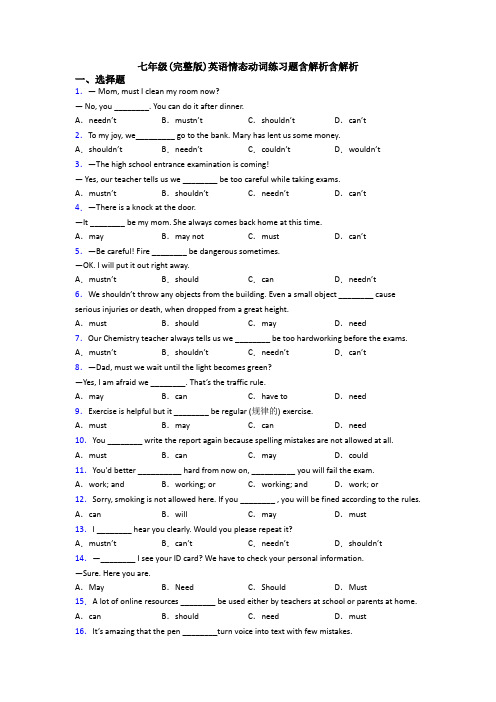
七年级(完整版)英语情态动词练习题含解析含解析一、选择题1.— Mom, must I clean my room now?— No, you ________. You can do it after dinner.A.needn’t B.mustn’t C.shouldn’t D.can’t2.To my joy, we_________ go to the bank. Mary has lent us some money.A.shouldn’t B.needn’t C.couldn’t D.wouldn’t 3.—The high school entrance examination is coming!— Yes, our teacher tells us we ________ be too careful while taking exams.A.mustn’t B.shouldn’t C.needn’t D.can’t 4.—There is a knock at the door.—It ________ be my mom. She always comes back home at this time.A.may B.may not C.must D.can’t5.—Be careful! Fire ________ be dangerous sometimes.—OK. I will put it out right away.A.mustn’t B.should C.can D.needn’t6.We shouldn’t throw any objects from the building. Even a small object ________ c ause serious injuries or death, when dropped from a great height.A.must B.should C.may D.need7.Our Chemistry teacher always tells us we ________ be too hardworking before the exams. A.mustn’t B.shouldn’t C.needn’t D.can’t 8.—Dad, must we wait until the light becomes green?—Yes, I am afraid we ________. That’s the traffic rule.A.may B.can C.have to D.need 9.Exercise is helpful but it ________ be regular (规律的) exercise.A.must B.may C.can D.need10.You ________ write the report again because spelling mistakes are not allowed at all. A.must B.can C.may D.could11.You'd better __________ hard from now on, __________ you will fail the exam. A.work; and B.working; or C.working; and D.work; or 12.Sorry, smoking is not allowed here. If you ________ , you will be fined according to the rules. A.can B.will C.may D.must13.I ________ hear you clearly. Would you please repeat it?A.mustn’t B.can’t C.needn’t D.shouldn’t 14.—________ I see your ID card? We have to check your personal information.—Sure. Here you are.A.May B.Need C.Should D.Must15.A lot of online resources ________ be used either by teachers at school or parents at home. A.can B.should C.need D.must16.It’s amazing that the pen ________turn voice into text with few mistakes.A.can B.must C.may D.need17.If you buy your mum an iRobot floor cleaner, she ________ sweep the floor every day. A.can’t B.mustn’t C.needn’t D.shouldn’t 18.— Zoe, what do you think is the greatest advantage of shopping online?— At least I ______ spend much time going from shop to shop.A.shouldn’t B.can’t C.needn’t D.mustn’t 19.Please don't make so much noise. I ________ hear the speaker very well.A.needn't B.can't C.shouldn't D.mustn't 20.—The high school entrance examination is coming!—Yes, our teacher tells us we _______ be too careful while taking exams.A.mustn't B.shouldn't C.needn't D.can't21.You ______ pay too much attention to your pronunciation, as it is so important in the oral (口头的) test.A.shouldn’t B.mustn’t C.can’t D.needn’t22.My bike was broken yesterday,so I____walk home.A.might B.had to C.must D.could23.Dr. Zhong Nanshan once said, "To prevent the spread of this disease, we________never be too careful."A.can B.may C.must D.should 24.—Will your mother be at home this Saturday?—Hard to say. She _______go to the countryside to see my grandparents.A.must B.may C.can D.would 25.When you visit a museum, some instructions should ________ and we’d better not________ them.A.pay attention to; be against B.be paid attention; againstC.be paid attention to; against D.be paid attention to; be against 26.When people are waiting at the zebra crossing, cars and buses ________ wait and let them go first.A.must B.may C.can D.need27.To avoid ________, we’d better ________ the parents’ meeting online.A.gather; hold B.gathering; hold C.gather; holding D.to gather; to hold 28.Hurry up, or we ________ miss the beginning of the film.A.should B.must C.may D.have to 29.—Must the children leave at six tomorrow morning?—No, they _______. They can have more time to get ready for the trip.A.can’t B.needn’t C.mustn’t D.may not 30.—Mum, why do I have to wear a mask before entering the supermarket?—For your health and safety, you ________ be too careful.A.shouldn’t B.can’t C.mustn’t D.needn’t31.A hard-working man ________ become a great scientist, but a great scientist ________ be a hard-working man.A.can’t; can B.may not; must C.can’t; must D.may not; can 32.According to the rule, used batteries ________ be dropped in the red bin for harmful wastes. A.may B.would C.should D.might33.You _________ smoke here! Look at the sign. It says "No smoking".A.needn't B.mustn't C.can D.may34.Never throw objects from the building. Even a small object ________ cause serious injuries, or death, when dropped from a great height.A.must B.should C.may D.need35.— Mum, why do I have to wash hands so many times a day?—You ________ be too careful, for your health.A.can’t B.mustn’t C.may not D.needn’t36.I think all the students love the weekends because, to them, they ________ get up early on Saturdays or Sundays.A.mustn’t B.don’t need C.needn’t D.can’t 37.—Hurry up, Jack! Let’s cross the road as fast as possible.—No, you ________. Don’t you see the light is still red?A.couldn’t B.wouldn’t C.mustn’t D.needn’t38.— Is the boy over there Tom? He often wears a jacket like that.— It _______ be him. He is absent from school today.A.needn’t B.shouldn’t C.mustn’t D.can’t39.—Is it really necessary for me to go shopping with a mask on?—I’m afraid you ________ in public. It is not only to protect yours elf but also to protect others. A.must B.should C.can D.need40.—Shall I tell him the change of the time right now?—I’m afraid you ________, otherwise he will be late for the meeting.A.can B.may C.must D.need41.—Will dad arrive home at 6 o’clock to hav e dinner with us this evening?— I think he will, but he ________ not. Sometimes he works extra hours.A.can B.must C.need D.may 42.Sometimes smiles ________ be false, hiding other feelings like anger, fear or worry. A.should B.would C.must D.can43.You’ve got an A in the maths test again. You ________ be good at it.A.can B.may C.must D.should 44.—The article says that a person’s animal sign decides his personality.—You ________ read it for fun, but don’t believe in that.A.can B.must C.shouldn’t D.needn’t 45.—How beautiful the winter jasmines (迎春花) are!—Yes. These golden-yellow flowers ________ be widely seen in my city in March.A.must B.can C.would D.should46.— What do you think of the show yesterday?— Some of them were really good but others ________ be better.A.will B.must C.need D.can47.—In China, many students have to stay up late to do their homework.—No worries. The government has realized the problem. I’m sure there ________ be good news soon.A.can B.should C.must D.need 48.—Who’s the man o ver there? Is that Mr. Black?—It ________ be him. Mr. Black is much taller than that man.A.may B.must C.can’t D.mustn’t 49.—May I have some wine to drink?—No, you ________. You have to drive home later.A.mustn’t B.needn’t C.can’t D.may not 50.—Is it usually warm in Yancheng in May?—Yes. But it _______ be rather cold sometimes.A.must B.should C.would D.can【参考答案】***试卷处理标记,请不要删除一、选择题1.A解析:A【详解】句意:——妈妈,我现在必须打扫房间吗?——不,不需要。
- 1、下载文档前请自行甄别文档内容的完整性,平台不提供额外的编辑、内容补充、找答案等附加服务。
- 2、"仅部分预览"的文档,不可在线预览部分如存在完整性等问题,可反馈申请退款(可完整预览的文档不适用该条件!)。
- 3、如文档侵犯您的权益,请联系客服反馈,我们会尽快为您处理(人工客服工作时间:9:00-18:30)。
初中英语情态动词专项练习题情态动词是一种本身有一定的词义,但要与动词原形及其被动语态一起使用,给谓语动词增添情态色彩,表示说话人对有关行为或事物的态度和看法,认为其可能、应该或必要等。
情态动词后面加动词原形。
情态动词有四类:①只做情态动词:must,can(could),may(might)……②可做情态动词又可做实义动词:need,will③具有情态动词特征:have(had,has) to,used to,ought to④情态动词表猜测:一肯一否三不定(must一肯,can not一否,may,might,could,三不定。
)注:mustn't代表强烈禁止 must表示主观,have to表示客观。
常用的有:can may could must have use .情态动词无人称和数的变化,情态动词后面跟的动词须用原形,否定式构成是在情态动词后面加"not"。
个别情态动词有现在式和过去式两种形式,过去式用来表达更加客气,委婉的语气,时态性不强,可用于过去,现在或将来。
情态动词属非及物动词,故没有被动语态。
情态动词表推测的用法小结(一)情态动词表推测的三种句式1.在肯定句中一般用must (一定),can,could(可能),might /may(也许,或许)。
e.g:(1)He must/can/may,might know the answer to this question.他一定/可能/也许知道这个问题的答案。
(2)It is cold in the room. They must have turned off the heating.屋里很冷,他们肯定把暖气关了。
2.否定句中用can’t / couldn’t(不可能),may not/might not(可能不)。
e.g:(1)It can’t/couldn’t be the headmaster. He has gone to America.这不可能是校长,他去美国了。
(2)He may not/might not know the scientist.他也许不认识那位科学家。
3.疑问句中用can/could (能……?)。
e.g:(1).Could he have finished the task?他可能把任务完成了吗?注:以上三种句式中情态动词的语气按程度都是依次递减的。
Might,could并非may,can的过去式,而表示语气较为委婉或可能性较小。
(二)情态动词表推测的三种时态1.对将来情况的推测,用“情态动词 + 动词原形”。
e.g:(1).She must / may / might / could arrive before 5.5:00前她一定/可能/也许到。
2.对现在或一般情况的推测,用“情态动词+ be”,“情态动词+be doing”或“情态动词+ 动词原形”。
e.g:(1).He must / may / might / could be listening to the radio now.他一定/可能/也许正在听收音机。
(2).He can’t ( couldn’t ) / may ( might ) not be at home at this time.这个时候他不可能/可能不在家。
3.对过去情况的推测,用“情态动词 + have +过去分词”。
e.g:(1).It must / may / might / could have rained last night .The ground is wet.地湿了,昨晚肯定/可能/也许下雨了。
(2).The door was locked. He can ( could ) not / may ( might ) not have been at home .门锁着,他不可能/可能不在家。
注:情态动词 should /ought to表推测时,意为“想必会,理应……”但与“have +过去分词”连用时,则又可构成虚拟语气意为“本应该做某事却没做”。
例如:(4).It’s seven o’clock. Jack should/ought to be here at any moment.现在七点钟了,杰克理应随时到达。
(推测)(5).Tom s hould not /ought not to have told me your secret,but he meant no harm. (虚拟)汤姆本不该告诉我你的秘密,可是他并无恶意。
can 和could 表示推测的用法对现在或将来的推测,两者均可用,但can 通常只用于否定句或疑问句中,一般不用于肯定句,而could则可用于肯定句、否定句和疑问句;对过去的推测,应在 can,could 之后接动词的完成式,且此时can仍只用于否定句或疑问句,不用于肯定句;而could 则可用于各种句型。
如:Can [Could] this be true? 这能是真的吗Where can [could] he have gone? 他能到哪里去了呢She can’t [couldn’t] have left so soon. 她不可能走得这么早。
注:could后接动词的完成式,除表示对过去的推测外,还可表示过去没有实现的可能性(即某事本来可以发生,却没发生),或委婉地责备某人过去应该做某事而没有去做(此时不用can)。
如:You could have started a little earlier. 你本可早点动身的。
You needn’t have cooked it. We could have eaten it raw. 你其实可以不煮熟(它),我们(本来)可以生吃。
can 和could 表示允许的用法表示现在的允许时,若是请求别人允许自己做某事,两者均可用,但用could 语气更委婉;若是自己允许别人做某事,一般只用 can,而不用 could。
如:Can [Could] I come in? 我可以进来吗“Could [Can] I use your pen? ” “Yes,of course you can.” “我可以借用你的钢笔吗?”“当然可以。
”(不能说Yes,you could.)表示过去的允许时,若表示过去一般性允许(即表示某人随时都可以做某事),用could;若表示在过去某一特定情况下允许进行某一特定的活动,则不用 could。
如:When I lived at home,I could watch TV whenever I wanted to. 我住在家里时,想什么时候看电影就可以什么时候看。
(一般性允许)I was allowed to see the film yesterday evening. 昨天晚上允许我去看了电影。
(特定的允许,不能用 could)can 和could 表示能力的用法can 表示现在的能力,could 表示过去的能力,要表示将来具备的能力通常be able to 的将来时态。
其中要注意的是,could 表示过去的能力,通常只用于表示过去一般性能力,而不表示过去具体某次特定情形下能够做某事的能力。
如:他学习很努力,所以考试能及格。
误:He studied hard and could pass the exam.正:He studied hard and was able to pass the exam.注:若在否定句中没有以上限制,即couldn’t 可表示过去特定情况下的能力,如可说 He studied hard but still couldn’t pass the exam.口诀:情态动词两特点动词原形接后面,说话语气较委婉。
can "能力"may"许可",must"责任"或"义务"。
否定回答needn’t换,"需要"need, dare"敢"。
should"应该",would"愿",have to"被迫"表客观。
情态动词专项练习题1. --- Where is Mary? --- She ____ in the library.A. should beB. must beC. can beD. must have been2. His room is dark. He must ____ to bed.A. goB. be goingC. have goneD. have been gone“I’m not sure, He ____to work.”3. “Will your father stay home tonight?”A. must goB. can goC. may be goneD. may be going4. “Where is Tom?”“He isn’t here I think he ____ have gone home.”A. mayB. mustC. mightD. A or B or C5. “I think Helen is at home.”“No, she ____ be at home, for she phoned me from the airport just five minutes ago.”A. mustn’tB. needn’tC. can’tD. daren’t6. He’s late. What ____ have happened to him?A. canB. mayC. should D, mustYes, he _____ be watching TV now.”7. “ _____ he be watching TV now?”No, he _____ be watching TV now.”D. Can; can; mustn’tA. Must; can; mustn’tC. Must; must; can’tB. Can; must; can’tNo, he ____ yesterday.”8. “____. He have left yesterday?”Yes, he ____ yesterday.”B. Can; can have left; can’t have leftA. Must; must have left; can’t have leftD. May; must have left; shouldn’t have leftC. Can; must have left; can’t have left9. You must be a writer, ____ you?A. mustn’tB. areC. mustD. aren’t10. You must have seen her yesterday, ____ you?A. mustn’tB. haven’tC. didn’tD. don’t11. You must have seen her, ____ you?A. haven’tB. didn’tC. don’tD. A or B12. There was plenty of time. She ____ worried or hurried.A. mustn’t haveB. shouldn’t haveC. must beD. needn’t have13. I got up early, but I ____ so because I had no work to do that morning.A. mustn’t have doneB. didn’t need to doC. needn’t have doneD. can’t have done14. I ____ up early this morning. So I stayed in bed till 9 a. m.A. needn’t have gotB. didn’t need to getC. shouldn’t have gotD. can’t have got15. The flower is dead. I ____ it more water.A. will giveB. would have givenC. must giveD. should have given16. He ____ have come here yesterday, but he didn’t.A. couldB. shouldC. ought toD. A or B or C17. “Must he do it?”“No, he ____.”A. mustn’tB. needn’tC. doesn’t have toD. B or C18. “Need you go now?”“Yes, I ____.”“No, I ____.”C. may; mustn’tD. can; needn’tA. need; needn’tB. must; needn’t“No, you ____.”19. “May I borrow your bike?”A. mustn’tB. may notC. had better notD. can’t“No, you ____.”or “No, please ____.”20. “Can I do it?”D. can’t; you don’tC. can’t; can’tA. can’t; doesn’tB. can’t; don’t21. I missed the last bus, so I ____ go home on foot.A. mustB. have toC. mayD. had to22. We ____ hurry if we want to arrive in time.A. mustB. needC. mayD. have to23. He ought to have won the first prize, ____ he?A. oughtn’tB. shouldn’tC. mustn’tD. oughtn’t to24. He ____ get up early when he lived in the countryside.A. wouldB. used toC. mustn’tD. can’t25. My brother ____ be very naughty, and my sister ____ like reading.A. used to; wouldB. would; used toC. used to; used toD. would; would26. ____ you please pass on a message to him?A. DoB. ShallC. MayD. Will27. ____ we set off now?A. ShallB. WillC. WouldD. ought28. “____ he open the window?”Yes, please.”A. DoesB. willC. ShallD. Would29. I’ve told him many times, but he ____ listen to my advice.A. shall notB. won’tC. will notD. wouldn’t“Yes, I ____.”30. “Will you lend me a hand?”A. willB. shallC. canD. may31. Everyone ____ do his best for the modernization of China.A. will youB. don’t weC. shall weD. do you32. Let’s clean our room, ____?A. will youB. don’t weC. shall weD. do you33. Let us watch TV, ____?A. will youB. don’t weC. shall weD. do you34. Close the door after you, ____ you?A. don’tB. doC. shallD. will35. Every time he meets me, he ____ to me.A. smiledB. would smileC. will smileD. is smiling情态动词部分1-5 BCCDC 6-10 ABCDC 11-15 DDCBD 16-20 DDBDB 21-25 DDDDC 26-30 DACDA 31-35 CCADC。
